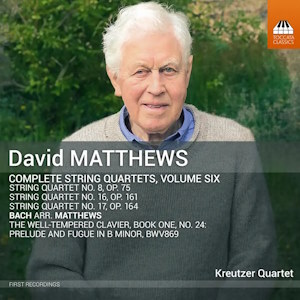
David Matthews (b. 1943)
Complete String Quartets Volume 6
String Quartet No 8, Op 75 (1997-1998)
String Quartet No 16, Op 161 (2021)
String Quartet No 17, Op 164 (2022-2023)
Johann Sebastian Bach (1685-1750)
Prelude and Fugue No 24 in B minor, BWV869 (arr. David Matthews)
Kreutzer Quartet
rec. 2016-23, locations below
Toccata Classics TOCC0732 [66]
It is amazing to realise that we have arrived at Volume Six of David Matthews’s complete – and continuing – cycle of string quartets. The project, started in 2010, is a major accomplishment by one of UK’s leading composers. All works get excellent performances by a group of musicians who have lived with his music, as Peter Sheppard Skaerved says, ‘for nearly all my adult life’. Needless to say, it is all superbly recorded, and at all sorts of venues, not that one can tell.
Can a composer be too prolific? In some of Matthews’s recent works (some of which I have heard live at the Presteigne Festival), I have felt that the ideas are not as arresting as in his earlier works. Not so with the string quartets. No.16 is a good example. In three movements played without a break, it is compact at just twelve and a half minutes, formally clear and well directed. Especially original and charming is robin’s song which appears over static harmonies in the slow movement. Matthews is not afraid to use key, as in the A major scherzo here, and to be lyrical in an English sort of way in the Andante first movement where the viola, as he writes in his essay, begins in G minor.
The earliest work here is the twenty-minute String Quartet No.8. The beautiful first movement is based on the Welsh folk tune The Blackbird but we only fully encounter it in the last minute or so of the movement. The Scherzo’s syncopated rhythms and displaced accents deliberately give a feel of contemporary popular music. The finale was composed at the time of the death in 1996 of Berthold Goldschmidt, whose four quartets had been recorded just a few years before. The intense opening makes way for a lyrical and heartfelt fugue. The final notes on the ‘first violin refer to the initials of Berthold Goldschmidt’s name’. This fine quartet is really enjoyable.
Of a similar length, the String Quartet No.17 demonstrates that Matthews is certainly not running out of ideas. Here we have a strong connection with Benjamin Britten to whom this quartet is dedicated ‘in return for all I learned from him’. The work falls into four movements. The second, a pizzicato Vivace, reminded me of Britten’s ‘playful pizzicato’ even before I had read the composer’s note. The finale was inspired by a dream, which as I know from personal experience can often throw up some original musical ideas. Matthews sat a piano with the score of Billy Budd in front of him, of which he had just attended a rehearsal. Instead of hearing Britten, however, he heard what became the opening five bars of the movemen, which he immediately wrote down.
There are remarks in the booklet about Matthews as a writer of counterpoint, especially fugues. His quartets are full of solid, memorable contrapuntal writing, especially in the opening flamboyant movement and in the intense B flat minor slow movement of No.17.
Making an ‘arrangement’ of an older masterwork is no mere exercise. Like his brother Colin who has spent years on and off magically orchestrating Debussy’s Preludes, David Matthews has arranged for string quartet pieces by Mozart, Beethoven, Schumann and so on – see Volume 5 (review). Here we have possibly Bach’s finest Prelude and Fugue, No.24 in B minor from Book One. A particular pleasure is in the Praeludium with the bass line played pizzicato, jazz-like. But this is no exercise, it is a re-creation. It respects the original but adds a dimension, and enables more musicians to enjoy this masterwork.
There are two essays in the booklet: Matthews’s Three More Quartets – and Bach with useful musical analysis, and A Personal Note, a longer essay by Peter Sheppard Skaerved, the Kreutzer’s first violin, where he goes into details as to why he finds these quartets so great. Indeed, Matthews’s now seventeen quartets should be esteemed and played regularly by a wide variety of ensembles so that we can assess their worth in comparison, for example, with Shostakovich (15), Vagn Holmboe (over 20) and Elizabeth Maconchy (13).
Of all of the volumes of Matthews’s Quartets that I have come across, this for me has proved the most interesting, revealing and enjoyable. If you are new to this music then this, I feel, would be a good place to start.
Gary Higginson
Buying this recording via a link below generates revenue for MWI, which helps the site remain free



Recording venues
Aldbury Parish Church, Herts, UK (No 8); 2023, Village Hall, Hastoe, Herts, UK (Nos 16-17); 2021, St. George’s, Headstone Lane, Pinner, Middlesex, UK (Bach)
















